Episodes
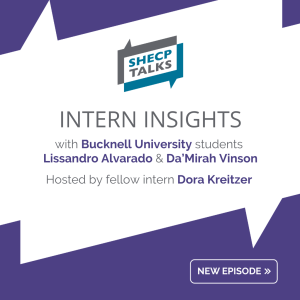
Tuesday Oct 31, 2023
Tuesday Oct 31, 2023
In today’s SHECP Talks episode, Dora Kreitzer talks with two other Bucknell University students, Lissandro Alvarado and Da’Mirah Vinson to discuss their SHECP Internships in Austin, Texas with Foundation Communities and Lisandro's second summer with SHECP as a Policy and Nonprofit Leadership intern. Foundation Communities provides affordable homes and free on-site support services for thousands of families, veterans, seniors, and individuals with disabilities. They offer community resources, like college application assistance, tax advice, healthcare, and housing.
During the episode, both Lissandro and Da'Mirah underline how their internships provided them with hands-on experience and a deeper comprehension of poverty-related issues. Da'Mirah recounts her time at Foundation Communities, where she engaged in community work and gained an appreciation for the significance of approaching social issues with empathy and a community-centric mindset. She reflects, "We work together to figure out solutions...I'm not here to fix anything. I'm just being in a community." Da'Mirah and Lissandro both expressed that their experiences have offered valuable insights into the kind of work they wish to pursue after graduation. Da'Mirah noted, "The internship showed me the mechanisms of a nonprofit and determined what I want and what I don’t want to do as my first career."
After gaining experience at Foundation Communities, Lissandro was a part of the Policy and Non-Profit Leadership Internship, spending this past summer in D.C. as an economic security analyst with the United Planning Organization (UPO). UPO supports Washington D.C.’s low-income residents on their journey to self-sufficiency. UPO currently offers more than 30 programs and services in such areas as early childhood education, youth development, job training and placement, health and wellness, housing, and volunteering. As an intern, Lissandro focused on the economic security for low-wage workers in the D.C. area. One important piece for Lissandro was being able to use his quantitative skills to understand poverty, merging data analytics major with his passion for poverty research. For Lissandro, being a part of SHECP again meant doing real policy work, “gaining the opportunity to present at the SHECP closing conference, and helping others interns who may be interested in the PNPL internship experience."
Dora also participated in the SHECP Internship Program last summer and worked with staff at Intersection of Change. "Intersection of Change is a community-based non-profit in Baltimore, MD founded in 1996 to address poverty-related challenges." During the episode, Dora reflects on how IOC's work really illustrated the difference between working for a community and working with a community. A community based model is one of the agency's top values --"We are an organization of and for our west Baltimore community that strives to affirm the dignity of all our residents by empowering them as participants, partners, and fellow leaders. We value the differences and commonalities that bring us together in our community." (intersectionofchange.org)
Austin, Washington D.C., and Baltimore all offered a lot of takeaways for both interns, and they hope that future SHECP interns try to get the most from this opportunity. Lissandro hopes future interns will remember – “Be meaningful during the internship: ask questions, be curious. There is always something to learn and be intentional in the work.”
Stay tuned for more engaging conversations on SHECP Talks as we explore the variety of experiences SHECP interns have, and the positive impact they create in their communities.
Want to know more about some of the agencies mentioned in the talk?
Foundation Communities: https://foundcom.org/
United Planning Organization: https://www.upo.org/
Intersection of Change: https://intersectionofchange.org
Interested in the Policy and Non-Profit Leadership internship?
Visit https://www.shepherdconsortium.org/policynonprofitleadership to learn more. The 2024 PNPL application will be available in late 2023. The internship is open to any rising-juniors and rising-seniors who have completed the traditional SHECP Internship. These internships will run concurrently with the traditional SHECP Internship. This new program has been made possible by funding from the Middlebury Conflict Transformation Collaborative.
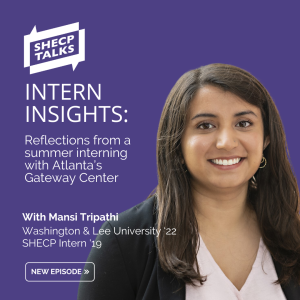
Wednesday Oct 04, 2023
Wednesday Oct 04, 2023
On this episode of SHECP Talks, Mansi Tripathi, a 2022 graduate of Washington and Lee University talks about her 2019 internship with the Gateway Center in Atlanta and her postgraduate Fulbright experience in Colombia.
The Gateway Center works "to connect people experiencing homelessness with the support necessary to become self-sufficient and find a permanent home.” Although the Gateway Center’s mission is pretty focused, the agency takes a more holistic approach to their programming. With efforts related to everything from housing to health to job readiness to education, they work to address the underlying barriers that prevent individuals and families from transitioning out of homelessness, such as unemployment, behavioral health, housing affordability, and medical conditions.
During her time in Atlanta, Mansi was able to work in several of these programs, including the clothes closet and resume development. One of Mansi’s primary roles was to work with outside volunteer groups to provide services to Gateway Center clients. Each outside volunteer group went through a guided orientation before their service and had a time to debrief after the work. Mansi and the others working with the volunteers were able to educate volunteers about the complexities of homelessness and challenge any preconceptions.
When reflecting on how her internship impacted the rest of her undergraduate career, Mansi describes how she realized her interest in criminal justice because of the ways in which homelessness is often criminalized. This motivated her to take classes about things that “make [her] the most productively angry.” She researched topics such as the language surrounding homelessness and pre-arrest diversion during her time at Washington and Lee. As part of the Bonner Program, she spent several years working with Project Horizon, an organization dedicated to reducing dating, sexual, and domestic violence in Rockbridge County, VA that runs an emergency shelter for victims of domestic or sexual violence.
Mansi encourages students interested in a SHECP internship to be open-minded and journal during the internship to unpack the experience. ”Go into it thinking, ‘Regardless I am going to learn something about this issue, the local area, and something about myself.’”
While at Washington and Lee University, Mansi majored in politics and sociology and minored in Poverty and Human Capability Studies. After graduating, she taught English to college students in Colombia as part of the Fulbright English Teaching Assistantship program. Now, she currently works in Washington, DC for the DC Public Defender Service as an Investigative Specialist.
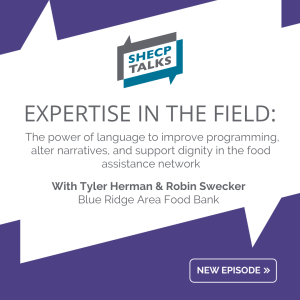
Thursday Apr 27, 2023
Thursday Apr 27, 2023
This week on SHECP Talks we interview Tyler Herman, Director of Partner Engagement, and Robin Swecker, relationship manager, from the Blue Ridge Area Food Bank (BRAFB). They discuss some of the challenges that BRAFB and other organizations face and how they use “people first language” to fight these difficulties.
Herman says that, when picturing food insecurity, the public often picture people missing meals or starving. While that type of food insecurity is devastating it is rare in the United States. Instead, people are often able to access cheap, unhealthy food through chain retailers. Herman discusses why it’s important to shift language from food insecurity to nutritional insecurity to combat false perceptions.
Our guests also discuss some of the stigma associated with getting food from a pantry or other similar organization. By utilizing “people first” language, this stigma is broken down. Many people, especially from older generations, have been paying into the system their whole lives. People first language ensures that these people can maintain their sense of pride while taking advantage of the resources available for them.
Finally, Herman concludes the discussion by explaining why people first language is critical to BRAFB’s mission. “When we start labelling groups or labelling people, we don’t see them for who they are as individuals, what their unique strengths, assets are, what they bring to the table,” says Herman. “Yes, it’s easier for our brain to create blankets and blanket language, but in that we don’t see the individual. Our solutions have also become blanket approaches. We need to shift to an equity lens, meeting that individual where they are… to actually get at the solutions we were trying to get at.”
For further information:
The Blue Ridge Area Food Bank serves 25 counties throughout Virginia in urban and rural communities. Their website can be found here.
The healthy eating guidelines from the supporting wellness pantries can be found here.
Feeding America — https://www.feedingamerica.org/partner-resource-page
Last November, SHECP hosted a Springboard series event to discuss how the language surrounding poverty influences and complicates our daily work and is addressed in various fields of study. Click here to watch the recording and learn more about the panelists. This podcast extends this discussion from the classroom to discussion happening with community partners and individuals these partners are hoping to reach.
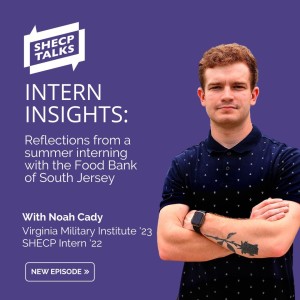
Monday Oct 10, 2022
Monday Oct 10, 2022
In this episode of SHECP Talks, Noah Cady, a first-class (or Senior to the rest of us) at the Virginia Military Institute, discusses his 2022 internship with the Food Bank of South Jersey.
The Food Bank of South Jersey is a massive operation with over 200 agency partners, programs of their own and a relatively large advocacy and education arm. Noah talks about his work with the agency’s health and nutrition programming, bringing in his “outsider” perspective, and his deepened understanding of the importance of strong, respectful relationships for impactful community programming.
Later in the episode, Noah talks about waking up to the email telling him that his summer internship was going to be with the Food Bank of South Jersey and being a little confused. Although he thought he would be in a medical clinic, he went into his placement with an open mind. Looking back, he reflected that it was the perfect internship to prepare him to be a creative physician and strong patient advocate down the road - “You aren’t here to totally learn about your career. You are here to learn about the people you are going to serve, and you are going to learn about people in general...It is a skill you’ve got to learn.”
His advice for students considering a SHECP Internship: “Just go for it! I don’t think you can get a better experience of where you get dropped into a community and [gain friends for life].”
For more information about topics Noah discusses:
Food Bank of South Jersey – The Food Bank of South Jersey (FBSJ) exists to provide an immediate solution to the urgent problem of hunger by providing food to people in need, teaching them to eat nutritiously, and helping them to find sustainable ways to improve their lives. FBSJ services Burlington County, Camden County, Gloucester County and Salem County. We remain the urgent solution these residents turn to when they are hungry and can’t afford to buy food. Through innovation and smart hunger-relief programming, the Food Bank has distributed over 150 million pounds of food, served more than one million fresh, nutritious meals to vulnerable children and provided tens of thousands of food boxes filled with healthy groceries to seniors. https://foodbanksj.org
Professional Insights event with Dr. Kelli Jarrell – Dr. Kelli Jarrell, a SHECP alum, talks about her work as a Social Emergency Medicine fellow, her development of the Social Emergency Medicine/Public Health Interest Group, and how her experience as a SHECP Intern impacted her professional life. Watch it here: https://youtu.be/8IKKQOQWAnQ
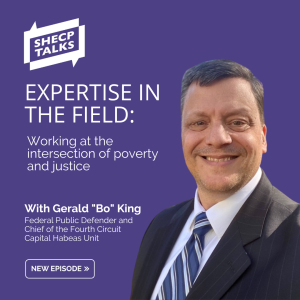
Tuesday Aug 30, 2022
Tuesday Aug 30, 2022
This summer SHECP hosted several events with innovative and dynamic leaders doing anti-poverty work. On this episode of SHECP Talks we will listen in on a talk SHECP’s director had with Gerald “Bo” King, Federal Public Defender and Chief of the Fourth Circuit Capital Habeas Unit.
King begins by explaining what capital habeas law is. Next, he explains how he sees poverty and the criminal justice system intersect during capital trials. “The death penalty is a product of poverty,” King says. “Death sentences depend enormously on the lack of funding for defendants facing death sentence or even the imposition of death sentences. States that put resources into capital defense, have very few death sentences. They are really intertwined.”
King also discusses trends in capital trials that he has seen throughout his career, specifically, whether capital trials and executions are becoming more frequent. King’s work has somewhat transformed over the years from being primarily rhetorical to telling the story of his clients. By painting a complete picture of his client’s lives he helps the jury understand what led the client to a crime that, at first, might seem inexplicable.
Finally, King takes questions from students and concludes his talk by discussing how he maintains his hope, as a capital defender, despite the odds often seeming difficult to overcome. “There are inspirations and sources of hope everywhere, not hoping is just not an option,” King says.
For further information:
David Shipler book: The Working Poor
Gilbert King book: Devil in the Grove
Center for Death Penalty Litigation
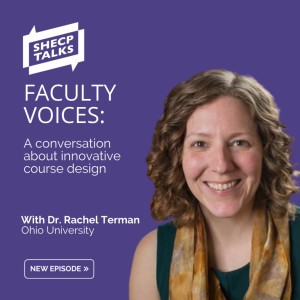
Monday Jun 27, 2022
Monday Jun 27, 2022
On this episode of SHECP talks we are joined by Dr. Rachel Terman, Associate Professor of Sociology at Ohio University. Dr. Terman joins us to discuss her class, Sociology of Appalachia, which covers everything from the correct pronunciation of Appalachia (app-ah-lah-cha or app-ah-lay-cha) to the economic history, and cultural ideas revolving around the region.
Terman works with Little Cities of Black Diamond, a nonprofit that represents a collection of former coal mining communities. Little Cities of Black Diamond seeks to preserve the history and culture of Appalachia through different events and programming. Terman’s students get involved with this organization and learn about the difference an organization can make in the communities it serves.
Terman discusses the three questions she hopes her students can answer at the end of the course. “What is Appalachia? Who are Appalachians? and so what?” says Terman, “They sound a little simplistic at first but I orient content to answer each of those questions.”
Finally, Terman describes some of her research, which revolves around the identities of Appalachian people. Terman’s research, particularly focused on Intergenerational Identities in recent years, points to a trend of younger generations continuing the work that older generations started.
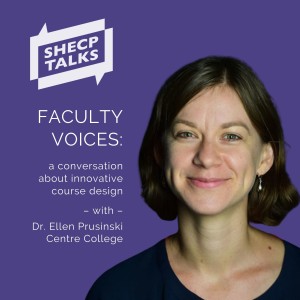
Sunday Apr 10, 2022
Sunday Apr 10, 2022
On this episode of SHECP Talks, we speak with Dr. Ellen Prusinski, Associate Professor of Education at Centre College, about her experience both in the classroom and outside of it, as a researcher.
Dr. Prusinski discusses the class she teaches now, “Education Policy and Social Change”, which examines the question: does education policy drive social change? Prusinski says “I think the class raises some really foundational questions about how we expect schools and education to be spaces that create more equity in our society and whether or not we have the policies to support that big social goal.”
She also talks about her role as coordinator of Engaged and Experiential Learning, and how that role affects the classes she teaches. Finally, she discusses her current research and how it was sparked by a student project that wanted to look at “childcare deserts”, regions that have far more young children than they have space in childcare.
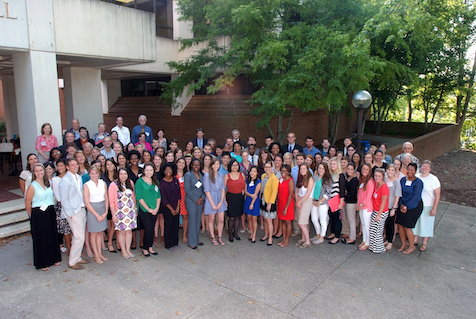
The Shepherd Higher Education Consortium on Poverty (SHECP), a 501(c)(3) nonprofit organization, encourages the study of poverty as a complex social problem, by expanding and improving educational opportunities for college students in a wide range of disciplines and career trajectories.
Through its programs, SHECP and its member institutions prepare students for a lifetime of professional and civic efforts to diminish poverty and enhance human capability, while also supporting connections among students, faculty, staff, and alumni engaged in the study of poverty.
Learn more at shepherdconsortium.org.



